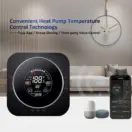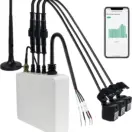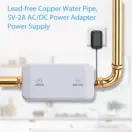การจัดการการใช้พลังงานในบ้านของคุณไม่เคยสำคัญเท่านี้มาก่อน ด้วยค่าสาธารณูปโภคที่เพิ่มสูงขึ้นและความตระหนักรู้เกี่ยวกับประสิทธิภาพการใช้พลังงานที่เพิ่มมากขึ้น การติดตั้งระบบที่เหมาะสมระบบตรวจสอบพลังงานภายในบ้านช่วยให้คุณติดตามการใช้งาน ลดขยะ และตัดสินใจอย่างชาญฉลาดมากขึ้นได้โดยตรงจากสมาร์ทโฟนของคุณ
แต่จะเลือกอันไหนให้เหมาะกับบ้านของคุณล่ะ?
คู่มือนี้จะแบ่งรายละเอียดคุณลักษณะสำคัญที่ต้องมองหา ความต้องการทั่วไปของผู้ใช้ และวิธีการเลือกระบบที่ตรงกับไลฟ์สไตล์และงบประมาณของคุณ
1. ข้อมูลแบบเรียลไทม์เทียบกับรายงานรายเดือน: เหตุใดความเร็วจึงสำคัญ
บริษัทสาธารณูปโภคส่วนใหญ่จะให้รายงานการใช้งานรายเดือนเท่านั้น แม้ว่ารายงานนี้จะให้ภาพรวมคร่าวๆ แต่ก็ไม่ได้ช่วยอะไรมากนักในการตัดสินใจในแต่ละวัน
Aเครื่องตรวจสอบพลังงานแบบเรียลไทม์เหมือนกับ Grus.ioWattPanel-2Xอัปเดตการใช้ไฟฟ้าของคุณทุก ๆ สองสามวินาที คุณจะสามารถ:
- จุดพลังงานพุ่งสูงทันที
- ระบุเครื่องใช้ไฟฟ้าที่กินไฟมากที่สุด
- ปรับเปลี่ยนพฤติกรรมของคุณได้แบบเรียลไทม์
ตัวอย่าง:คุณอาจพบว่าเครื่องอบผ้าของคุณกินไฟ 2 กิโลวัตต์ชั่วโมงต่อรอบ ซึ่งเป็นตัวเลขที่คุณไม่ทราบจากสรุปข้อมูลรายเดือน
2. คุณต้องการตรวจสอบหรือควบคุม?
ระบบพื้นฐานจะติดตามปริมาณพลังงานที่คุณใช้ แต่ระบบอัจฉริยะจะช่วยให้คุณดำเนินการได้
ลองคิดดูเหมือนกับว่าเครื่องติดตามการออกกำลังกาย: มันไม่ได้แค่บันทึกขั้นตอนเท่านั้น แต่ยังช่วยให้คุณตั้งเป้าหมายและพัฒนาตัวเองได้อีกด้วย เครื่องวัดพลังงานที่ดีควรช่วยให้คุณ:
- ตั้งค่าการแจ้งเตือนการใช้งาน
- ติดตามเครื่องใช้ไฟฟ้าแต่ละเครื่อง
- บูรณาการกับปลั๊กอัจฉริยะหรือระบบอัตโนมัติ
หากคุณใช้ Alexa, Google Home หรือเทอร์โมสตัทอัจฉริยะอยู่แล้ว ตรวจสอบให้แน่ใจว่าเครื่องตรวจสอบพลังงานของคุณเข้ากันได้
🧠 เคล็ดลับ: มองหาการตรวจสอบหลายวงจรหากคุณต้องการข้อมูลระดับอุปกรณ์
3. การติดตั้ง: ทำเองได้หรือมืออาชีพ?
หากคุณถนัดงานช่างก็ลองมองหาเครื่องตรวจสอบพลังงานแบบ DIYซึ่งไม่จำเป็นต้องเดินสายไฟใหม่
อุปกรณ์บางชนิดติดตั้งได้ภายในไม่กี่นาทีโดยใช้แคลมป์ไฟฟ้าและ Wi-Fi โดยไม่ต้องเดินสายไฟใหม่หรือต้องอาศัยช่างไฟฟ้า ส่วนอุปกรณ์อื่นๆ โดยเฉพาะระบบแบบทั้งบ้าน อาจต้องใช้ช่างติดตั้งที่มีใบอนุญาต
💡ตรวจสอบก่อนซื้อ:
- รองรับบ้านแบบแยกเฟสหรือสามเฟสหรือไม่?
- มีคำแนะนำการตั้งค่าโดยละเอียดหรือวิดีโอสอนมาพร้อมหรือไม่
✅สินค้าที่เกี่ยวข้อง:WattPanel-2X: การตรวจสอบพลังงานแบบแยกเฟสอัจฉริยะ
4. คุณควรใช้จ่ายเท่าไร?
การตรวจสอบพลังงานที่ดีไม่จำเป็นต้องมีราคาแพง
คุณสามารถค้นหาระบบราคาประหยัดต่ำกว่า 200 เหรียญข้อเสนอนั้น:
- การติดตามแบบเรียลไทม์
- แอพสมาร์ทโฟน
- รองรับหลายวงจร
- การติดตั้ง DIY
เมื่อเวลาผ่านไป ระบบจะคืนทุนให้กับตัวเองโดยช่วยให้คุณลดขยะลง
🔎 เคล็ดลับ: มองหาโมเดลที่ไม่มีค่าธรรมเนียมรายเดือน
5. คุณสมบัติหลักที่ต้องมองหา
บ้านแต่ละหลังไม่ได้ต้องการคุณสมบัติเหมือนกันหมด ต่อไปนี้คือสิ่งที่ควรพิจารณา:
| คุณสมบัติ | เหมาะสำหรับใคร |
|---|---|
| การติดตามแบบเรียลไทม์ | ทุกคน |
| การตรวจสอบหลายวงจร | เจ้าของบ้านที่มีแผงโซลาร์เซลล์ เครื่องชาร์จรถยนต์ไฟฟ้า หรือเครื่องใช้ไฟฟ้าขนาดใหญ่ |
| การแจ้งเตือนตามแอป | นักเดินทางบ่อยครั้งหรือครอบครัวที่ยุ่งวุ่นวาย |
| การบูรณาการผู้ช่วยเสียง | ผู้ใช้งานบ้านอัจฉริยะ |
| รีโมทคอนโทรลและปิดเครื่อง | เจ้าของบ้านพักตากอากาศหรือเจ้าของบ้าน |
อย่าจ่ายเงินมากเกินไปสำหรับฟีเจอร์ที่คุณจะไม่ได้ใช้ แต่ก็อย่าประเมินสิ่งที่คุณอาจต้องการในอีกหกเดือนข้างหน้าต่ำเกินไป
6. ผลประโยชน์ระยะยาว
คุณค่าที่แท้จริงของเครื่องตรวจสอบพลังงานภายในบ้านไม่ได้ขึ้นอยู่กับค่าไฟปัจจุบันเพียงอย่างเดียว เมื่อเวลาผ่านไป เครื่องตรวจสอบพลังงานจะช่วยให้คุณ:
- เปลี่ยนเครื่องใช้ไฟฟ้าที่ไม่มีประสิทธิภาพ
- ตรวจจับการสูญเสียพลังงาน "ชั่วคราว" (เช่น เครื่องชาร์จที่เปิดตลอดเวลา)
- ลดรอยเท้าคาร์บอนของคุณ
- เตรียมการสำหรับการเพิ่มพลังงานแสงอาทิตย์หรือแบตเตอรี่สำรอง
🎯 บางระบบยังให้บริการข้อมูลทางประวัติศาสตร์ช่วยให้คุณเปรียบเทียบการใช้งานแบบเดือนต่อเดือนหรือแบบฤดูกาลต่อฤดูกาล
✅ Energy.gov’sเครื่องประหยัดพลังงานภายในบ้านสำหรับเคล็ดลับในการลดการบริโภค
ทำไมการตรวจสอบพลังงานอัจฉริยะจึงคุ้มค่า
ไม่ว่าคุณจะพยายามประหยัดเงิน เป็นมิตรกับสิ่งแวดล้อม หรือเพียงแค่ควบคุมการใช้ไฟฟ้าในบ้าน ระบบตรวจสอบที่เหมาะสมจะช่วยให้คุณตัดสินใจได้ดีขึ้นโดยไม่ต้องคาดเดา
AtGrus.io,WattPanel ซีรีส์ออกแบบมาเพื่อเจ้าของบ้านโดยเฉพาะ ด้วยฟีเจอร์ต่างๆ เช่น ข้อมูลแบบเรียลไทม์ การติดตามหลายวงจร การควบคุมผ่านแอปมือถือ และการตั้งค่าที่ง่ายดาย การตรวจสอบและจัดการพลังงานของคุณจึงง่ายกว่าที่เคย
📲 พร้อมที่จะควบคุมหรือยัง?
เยี่ยมGrus.ioเพื่อสำรวจอุปกรณ์พลังงานอัจฉริยะที่ออกแบบมาเพื่อช่วยให้คุณประหยัดพลังงาน ลดค่าใช้จ่าย และใช้ชีวิตอย่างชาญฉลาดมากขึ้น



